Lee Jung-jae is King of the World
- Oops!Something went wrong.Please try again later.
- Oops!Something went wrong.Please try again later.
The King of the World, at least for today, is a walking, talking sun—quite possibly the most generous, charismatic of such entities you'll ever meet—pulling anyone within earshot into his orbit, radiating warmth. An enemy to no one, a friend to all, yes, even you. It's afternoon in late November and the ball of scorching plasma in question is the actor Lee Jung-jae, who, by way of Squid Game, went from being one of Korea's most bankable celebrities to one of the most recognizable stars in the world in just one season.
He and his team of publicists and managers have descended upon the Hearst Tower in New York City to film a video for Esquire. And while Lee readies himself for 45 minutes of questions about Squid Game, now the most-watched show on Netflix ever, one of them is outside, on the phone, trying to make a dinner reservation. Marea? Marea would be nice. They ate room service last night. Can't happen again. The rest of Lee's crew is scattered around, speaking Korean and English and Korean again to each other—everyone is in town for the Gotham Awards where, the evening before, Squid Game won one of its top prizes—doing any number of things publicists and managers do to make sure the day goes smoothly and, also, that Lee is ready for his spot tonight on The Late Show With Stephen Colbert.
Stephen Colbert is important, but so is food. I'm wondering, is Lee Jung-jae Korea's most eminent foodie, constantly hungry, in dire need of an expensive Italian dinner, or all of the above?
Two women from Team Lee sink into a chaise. Maybe they should ask the concierge at the hotel about dinner.
Exhausted. Everyone seems exhausted.
Actually. That's a lie. Lee is beaming, moving around, dutifully greeting the next person, and the next person after that. A week before, I met with him over Zoom—he was in Seoul, South Korea, I was home for Thanksgiving—and found him perfectly charismatic, but encountering him here, in person, and the cosmic descriptors suddenly feel inevitable. He is the effortless center of it all. Lee speaks English with the help of a translator, but even without one, he breaks out this small, sweet smile when he wants to say that he understands you. He leans forward when he talks, grins, and shakes your hand, gracious even in body language.
Filming's about to start. Lee takes a tablet, loaded with a slideshow of Squid Game-isms, and looks up, straight at the camera. Everyone else may be tired, but Lee Jung-jae, moving at hundreds of thousands of miles per hour, is ready to work.
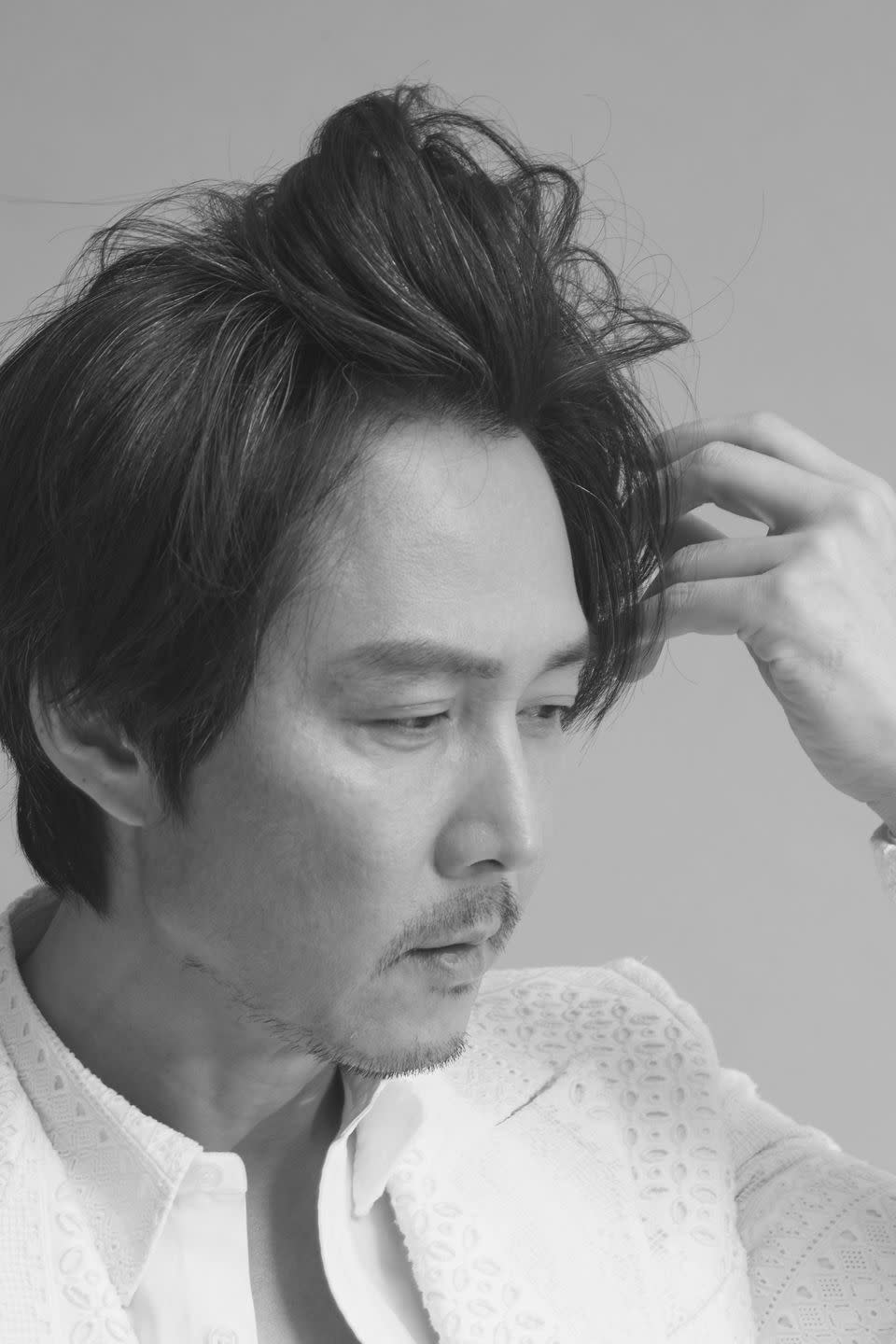
Lee has played the Squid Game, many times. Growing up in the '70s in Seoul, it was a perfect way for him and other kids his age who didn't have much money to burn time—all you needed to know were the rules and how to draw a series of squares and circles on the ground. If you're the single person on this planet who has not watched Squid Game, the Netflix series, think of it like a moderately violent hopscotch. The goal is to get from one end of the play area, which loosely resembles the head and tentacles of a squid, to the other. One team does the moving. The other does the stopping. "If you really get into the game," Lee warns, "it can get a little bit aggressive."
The actor is remembering the nicks and scratches of his childhood, kids screaming and crying, exorcising demons on the blacktop. But the show's creator, Hwang Dong-hyuk, imagined something—and this is putting it gently!—bloodier. The series, which debuted in September, follows Seong Gi-hun (Lee), a man terminally down on his luck, who gets recruited to play in a series of childhood games for a drool-worthy amount of money. During the first game, which involves automatic weapons and a 10-foot-tall robo-doll, Gi-hun finds out that if you lose, you're executed. Things get violent. Incredibly so. Watched by over 100 million people, many of whom rocked stuffy green tracksuits this Halloween, Squid Game is a nightmare-gifting critique of capitalism; of those who suck the less fortunate dry, and especially those who do it while sipping champagne.
For all of the show's triumphs, and its swelling trophy shelf (count Critics Choice Awards nominations for Lee and Squid Game as the most recent honors) it's just about impossible to imagine the show becoming what it was without the 48-year-old actor. His performance is just as manic as it is big-hearted, hilarious as it is tragic. It's the most visceral, convincing journey from deadbeat to do-gooder you'll see, certainly this year, maybe for a long time—something Hwang up-voted when I asked him about his star's performance. Here's what he wrote:
The biggest challenge in portraying Gi-hun is the journey from a "loser" who almost looks dumb in the first episode to the serious red-headed Gi-hun turning around and walking toward the camera. Making that change convincing was the most difficult challenge, and Jung-jae did just that, portraying a Gi-hun growing and changing bit by bit in each episode. If he hadn't pulled it off, I don't think we could have done the red hair at the end. (laughs)
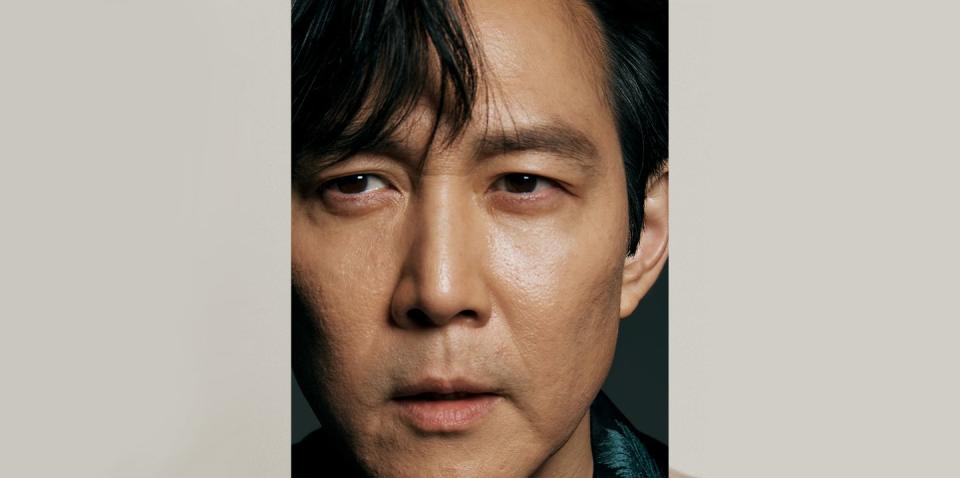
Still, Squid Game has faced criticism, from those saying its message is lost in the show's no-brakes embrace of violence, to those who stand with, wow, LeBron James in arguing that its finale—where Gi-hun chooses going after the puppeteers of the survival competition over reuniting with his estranged daughter—was a bit dubious.
"I think Squid Game provides a clear message that people cannot succeed without the help of others," Lee says. "When Gi-hun tries to get on the flight to visit his daughter, he realizes that other people could be sacrificed with the same game. He wants to prevent these bad things from happening to these innocent people. So he wants a better world for everyone. I think this is a desperate message that this show tries to get across."
Bronny's beef with Squid Game was one of the dozens of is-this-real-life moments birthed from the show's mania. Another one had just finished its tour de Twitter when I brought it up. A dapper-looking Lee was strolling the red carpet at the LACMA Art+Film Gala, when a reporter remarked, "I'm sure you can't leave the house anymore without people recognizing you," missing the memo of Lee's long-established household-named-status in Korea. I ask if it's frustrating when Westerners next big thing Korean culture.
"For you, I'm sure you can't leave the house anymore without people recognizing you. What has been the biggest life change for you since the series came out?"🤡
OH THE CRINGE pic.twitter.com/Z9h35yDWxG— Fel (@Fel_Space) November 10, 2021
"I wasn't offended at all," he says. "They just didn't have the opportunity to see a Korean movie, see a Korean TV series. I don't think it's something that we should criticize her for. And just the fact that a lot of people haven't watched Korean TV series prior to Squid Game, it's just another push for us to work harder so that we can have the next Squid Game. So I would never say, 'Why don't you know that I have been a star all along?'"
Well, he has been a star all along, and the origin story goes like this: In his late teens, Lee worked as a cashier at a cafe in the daytime. At night, he'd take private lessons in interior design, the career he, then, always wanted. One day, a well-known designer, Ha Yong-soo, walked up to the register. He saw the warmth, the energy, incandescence. There was to be a shoot, and something was wrong with the model. He couldn't come.
"What size do you wear? Ha asked.
Lee told him.
"It's going to fit. Do you want to model for a magazine?"
"I'm in the middle of cashiering for the cafe."
The cafe owner told him to go—Lee thinks it's a one-time thing, but magazines call after the shoot wanting to shoot him again. And after those shoots, they call again. Again and again, this goes, until Lee Jung-jae woke up one morning and realized, he's a full-time model. Soon, he's a full-time actor, too, first gaining fame as the resident heartthrob in the Korean TV drama Sandstorm. "For the first five years, it was really difficult for me," he says. "I would get scared just by the idea that I have to get to the set, because I really didn't know what to do. I didn't know how to act. But at the same time, I felt a big responsibility. I have to do it well."
He did. And over the next 30 years, he built one of the biggest careers in the country. He has a chameleonic ability to become anything and everything and have you believe that he is exactly that. It's a little Keanu Reeves-esque, his approach. He's played a god, a love interest, a UFC fighter, and an egomaniac, doing his own stunts whenever possible. He's acted in seven of South Korea's top 100 highest-grossing films, but hey, who's counting.
The breakout role was 1999's City of the Rising Sun, where Lee plays a gambler in a quasi-coming-of-age story. "It was like a restoration of confidence for me," Lee says. "I realized that acting could actually be fun." He was 27 years old, and he even let himself think he'd reached a turning point in his life.
"Actually, it wasn't."
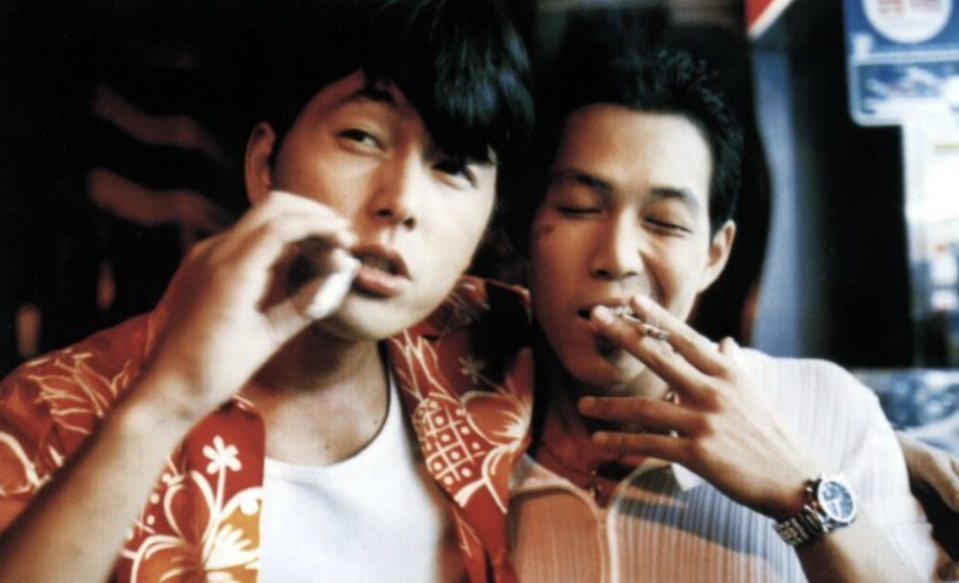
Squid Game has already reached the level of mass cultural shorthand that, when we talk about it, we say the *blank* scene, and the entire thing—who said what, the gore, the WEEP WOOP—whooshes to your brain from wherever repressed recess it's been burrowed. Especially the Dalogna scene, and especially for Lee. When I bring it up, he looks like he might break out a half gallon of sweat all over again.
"It was the hottest day of summer," Lee says. "Because it's made of sugar, it would melt, and you're supposed to break it—but it won't break because it's already melted. So it would just become crooked and not break clearly. The most difficult game to shoot was the Dalgona scene. Time is ticking, which means that I have to act out his panic. It goes up every minute, so I have to show that panic in different phases."
Keep in mind: The superlative of most difficult game is not something Lee tosses around lightly, considering that—during the tug-of-war scene—he had to pull a rope attached to an industrial-sized crane. "Our hands turned red, and the ladies had cuts in their hands, and we had to exert a lot of force in order to really show that authenticity," he adds.
Even though Netflix hasn't formally announced plans for Season Two of Squid Game, Lee seems game to return for more episodes, even hinting that we might see more of Gi-hun's humorous side—which is something we sometimes glimpsed amidst, well, the murderous stakes and gift-wrapped coffins of Season One. "Because Gi-hun became more serious because he has to rescue these people, I'm thinking that he would become a more determined character," Lee says. "But if he's just too determined, that could be a little bit boring. So I'm guessing the fun parts of Gi-hun will also come out in the next season."
The man's been in enough blockbusters to know that you have to leave something to the imagination. He wisely stops himself.
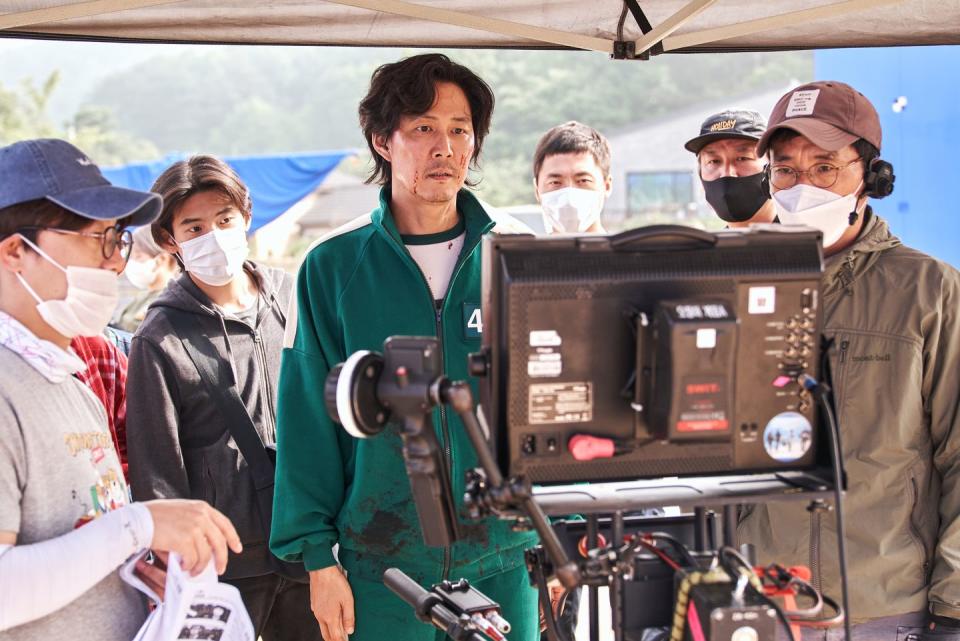
A thing happens when you get good at something. You start comparing yourself to the person next to you. Why can't I do that? Where did they learn this? That thing you worked so hard at—acting, in Lee's case, a life presented to him at a cafe counter—becomes a little less fun. Then, a lot less fun. You don't know why you're doing it, this thing you gave years and years of your life to, or maybe, for. Your light goes out.
"In the early 2000s, I thought really deeply about giving up on this job as an actor," Lee says. "I wanted to leave the show business. For two years, I didn't act."
I ask him what he felt was missing from his life.
"Because I was nonstop comparing my acting [to others], it didn't give me any joy," he says. "I didn't find it interesting at all. It was just some difficult work that I to get done. So then, I just thought, Okay, then maybe this is all the talent I have in this field. So if that is what it is, then I guess I'll have to give up. It was very difficult for me."
On the other end of the comparisons, looking for other work, the doubt: Lee becomes one of the biggest stars in his country, looking like—to put it simply—he was having fun. "As I got older, I started comprehending where people found joy," he continues. "I really, with my heart, felt what people were thinking or what kind of ideas people had. I could apply that to my acting. So I think that was the turning point for me. People told me that I became more expressive. They saw more authenticity in my acting. I felt more grounded."
Nowadays, Lee can't stop working. When he was filming Squid Game, he toiled away on the script for Namsun, a spy thriller that he's not only writing, but also producing, directing, and starring in. If Hollywood offers start piling on Lee's metaphorical desk—I'm sure they're already rolling in, but he won't tell me that—he says, "I'm up for it." There's the matter of the probably-definitely-happening second season of Squid Game, which he would have to film, of course, not to mention the other scripts he's working on, and—this is when Lee, at long last, admits that stamina is a problem.
"I think that that time of turmoil was something that I needed, to realize that this is the job I need," he says. Lee figures the next three to four years will be the busiest time of his life.
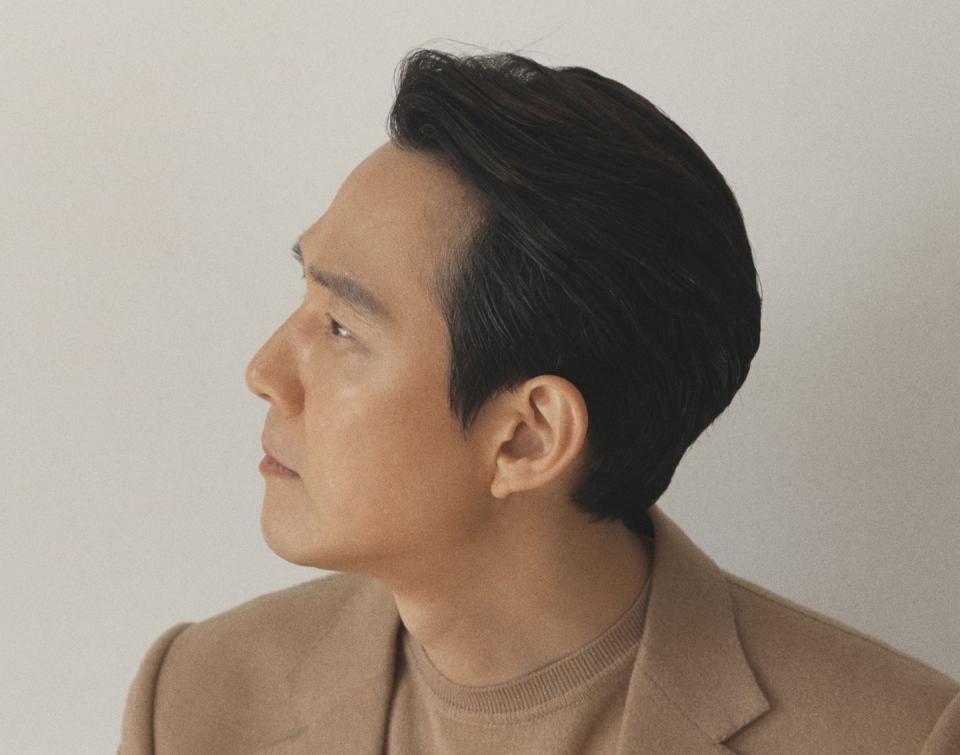
When Lee wraps up the video, every last question about fan theories and Season 2 and what he'd do with 46.5 billion won dutifully answered, he stays in his chair for a moment. He looks calm, per usual, watching the bustling around him, his axis spinning a little slower now, laptops shutting, cameras turning away. Since his posse will have him out the door, hustling the next thing—Mr. Colbert is tonight, remember, hair and makeup before—sometime in the next 45 to 60 seconds, I walk in to say goodbye, good luck, and dear god, if he's eating something other than room service tonight.
"It's not that I wanted to get some food tonight," Lee says, leaning so far forward that he's in danger of falling out of the chair. "I really didn't get to have a nice meal with my team. And since tonight's the last night in New York, I told them, whatever you want to eat, we'll go get it. Tell me."
He stands up, straightens out his jacket, that small smile—the one that tells you he understands—opening into a bright, shining grin.
You Might Also Like

